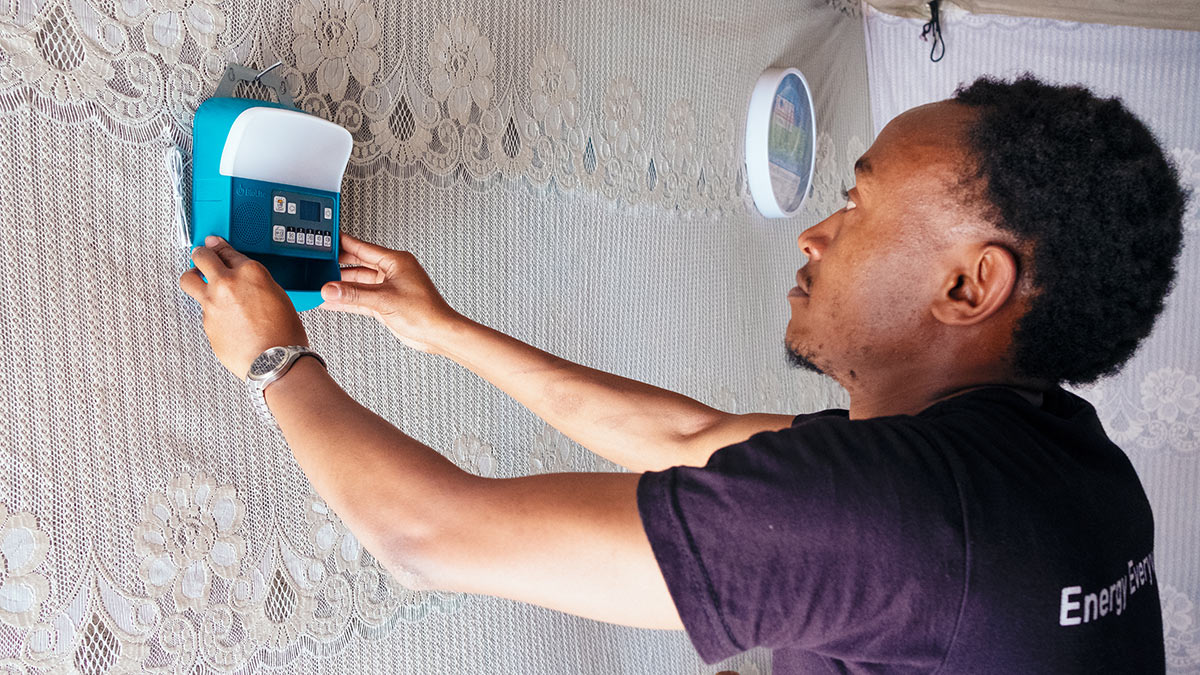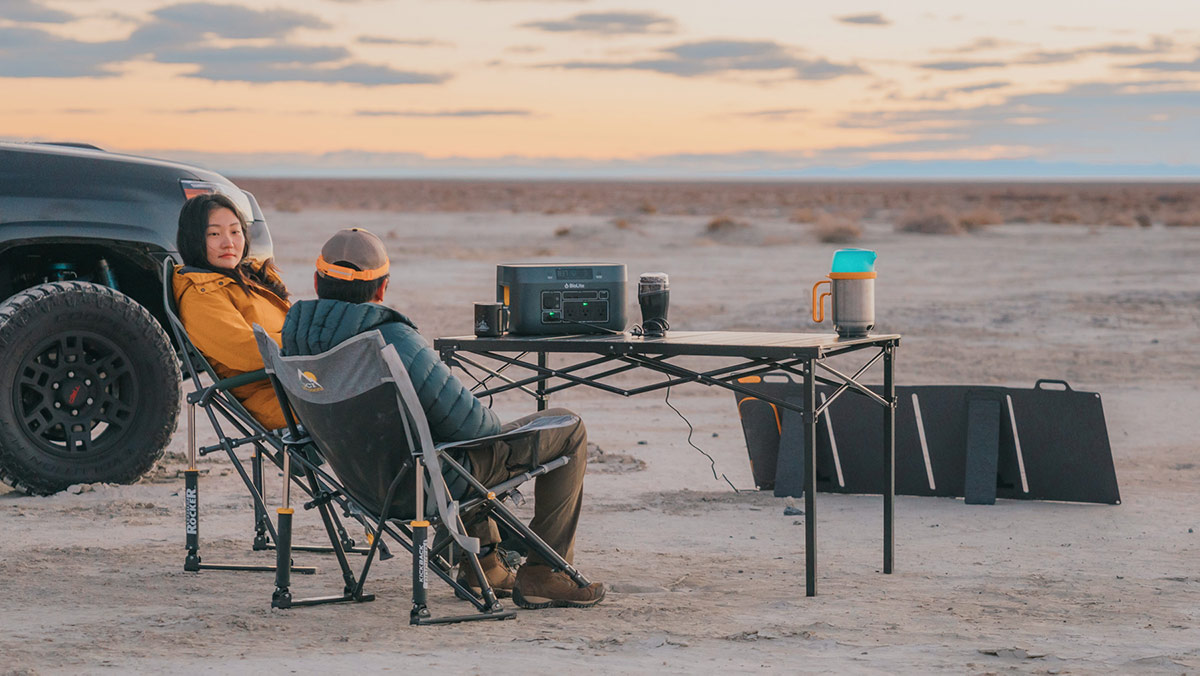When we spend time outside, we often make choices and mull trade-offs: Does the weather demand a down jacket or synthetic? Should we paddle a canoe or a kayak? Hop on a road bike or a mountain bike?
But trade-offs didn’t appeal to Jonathan Cedar and Alec Drummond. Choosing one path or another felt like limiting their ambitions. Why not try to do more, all the time? they wondered. Why not think “and” when others thought “or”? Gear maker BioLite, Cedar and Drummond’s company, has built success on this philosophy.
BioLite unites the duo’s love of the outdoors with a passion for engineering and design. Their products provide more than heat and light. They help customers in the outdoor recreation market and those in lower-income countries cook, charge devices and illuminate their homes and other spaces off the grid— all while balancing profits with a commitment to environmental and humanitarian goals.
And not or.

Since launching 15 years ago, BioLite has grown from a small venture producing efficient, wood-burning stoves for camping to a global company with a goal to provide access to affordable clean energy for 20 million people in off-grid households. Through retailers like REI, BioLite sells products ranging from rechargeable headlamps and lanterns for camping to solar panels and portable power stations that can electrify homes or campsites. Its customers span North America, Europe and more than 20 countries in Africa; and it has 95 employees in New York and Kenya.
BioLite started as companies often do—when its founders noticed a problem in need of a solution. Cedar and Drummond were passionate outdoor enthusiasts who didn’t like using petrol-powered camp stoves. They wanted a cleaner alternative that they could fuel with abundantly available wood and twigs. The two were also skilled engineers who worked together at an industrial design firm. Around 2006, the friends began tinkering. As they delved into the world of wood-burning stoves, they attended a conference in the field. They were shocked to find that about one-third of the world’s population cooks over open fires or inefficient stoves that use kerosene or coal, which is costly and pollutes the air.
The two knew they could do better.
“It just felt like such an amazing opportunity,” said Cedar, CEO of BioLite. “This is where I get to contribute to the climate problem through energy solutions.”
Balancing Outdoor and Emerging Markets
But the venture faced a paradox. The outdoor recreation market had higher margins and clear avenues for distribution and sales but was relatively small. The cookstove market in lower-income countries was massive, but it had low margins and the sales infrastructure was either fragmented or nonexistent. Funding was another challenge. The company could seek philanthropic dollars, but that would leave it dependent on the whims of donations or grants.
So BioLite’s founders opted for a different strategy. They pursued a business model built on “parallel innovation” where the two markets could stabilize each other. While consumers in the outdoor and emerging markets had different needs, the technology was essentially the same. The unconventional approach found support from one of its early investors, a fund created by Clayton Christensen, a Harvard professor who pioneered the theory of “disruptive innovation” and new models to serve unmet market needs.

In 2012 the startup released its first product for the outdoor market. The BioLite CampStove burns sticks and twigs, using the heat generated to spin a small fan that feeds the flames and creates a more efficient, smokeless fire. It also includes a unique technology that harnesses waste heat and converts it into electricity that flows into a USB port for charging phones and other devices. (REI was an early retailer of the CampStove, helping the then-small company scale its business at the time). BioLite then began selling a larger model, HomeStove, with a slightly different configuration for consumers in India and Uganda.
Soon, BioLite shifted its emerging market focus to multiple African nations and began producing efficient, charcoal-fueled stoves that cut fuel consumption and reduced toxic emissions. Customers could pay for the stoves over time through digital payment plans, using the money they saved from burning less fuel and free phone charging to help finance the devices. Then, in 2017, the company started selling carbon offsets for the stoves, calculating the amount of planet-warming pollutants that were avoided by using BioLite products. The carbon offsets also let them lower the price of the stoves. (REI bought carbon credits from the BioLite Improved Stove Programme in Uganda as part of its commitment to halve its emissions and to reduce its greenhouse gas emissions 55% by 2030 while offsetting some emissions.)
But BioLite was just getting started.
Going solar
“It was always our intention to be an energy company and do cooking, charging, lighting,” Cedar said.
In 2015, the company developed and released its first non-stove product: the PowerLight, a lightweight, USB rechargeable lantern. It was eventually replaced by the AlpenGlow lantern that’s perfect for camping or backyard hangouts. Then came the FirePit, which applied BioLite’s smokeless tech to the traditional campfire.
Two years later, BioLite made the jump into larger solar power systems for electrifying homes in emerging markets. Worldwide, more than 700 million people lack electricity. For most, off-grid solar is the cheapest, quickest solution for accessing power, reports GOGLA, the global association for the off-grid solar industry based in the Netherlands.
“Companies like BioLite have played a fundamental role in enabling 420 million people to gain energy access in the last decade. Many of these people would have otherwise remained in the dark,” said Koen Peters, GOGLA’s executive director, by email.
BioLite began selling SolarHome 620 in Africa in 2017, and then as a limited release in high-income countries. One of the challenges of marketing solar power in remote environments is making sure the home devices are simple enough to install so that a non-electrician can do it. In 2021, the company unveiled BioLite Academy, a curriculum delivered via cell phones to train people to install the systems.

The next frontier is its Solar Generator System, which includes BaseCharge, a portable power station that can be charged via a standard wall outlet, a vehicle or by connecting to BioLite’s solar panels. The devices supply power during outages or when you’re camping or overlanding, replacing carbon-intensive alternatives like diesel-burning generators.
A Climate Commitment
Cedar is gratified to see consumers buying BioLite’s growing line of climate-friendly products and curbing emissions in the process. But he’s also excited about the potential broader impact: showing the public that a cleaner future will be a better, more enjoyable experience than the one now offered by fossil fuels.
BioLite is also trying to lead that transition by example. For more than a decade, the company has been calculating and sharing details about its own carbon footprint. It has worked to reduce emissions generated by its operations and annually paid for offsets that remove carbon elsewhere.

In 2019, Cedar went a step further, partnering with Peak Design founder and CEO Peter Dering to create Climate Neutral. The initiative certifies companies that tally their emissions and zero-out corporate contributions to climate change. Participants can use the “Climate Neutral Certified” label to identify their products as coming from a carbon-neutral company. REI joined the effort in 2020, making it the largest brand at the time to sign on.
On its website, BioLite publicizes its broader ambition: “We are on a mission to empower people and protect our planet through access to renewable energy.” But doing so has meant shouldering a higher financial burden, opting for lower-margin sales in emerging markets and voluntarily paying for carbon offsets. Creating a business is hard, so why make it harder?
Cedar admits that striving to be a corporate climate leader isn’t always easy. Ethically, though, it’s the right thing to do, he says. What’s more, he believes, the hard work now will make BioLite competitive in the future.
“Is the bar high for us today? For sure,” Cedar said. “But you don’t have to squint very hard to believe that this is what good business looks like 10 years from now.”
